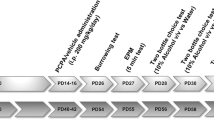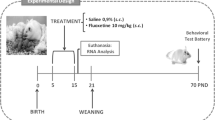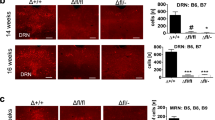Abstract
Rationale
Serotonin (5-HT) is a monoamine neuromodulator that plays a key role in the organization of the central nervous system. 5-HT alterations may be associated to the emergence of social deficits and psychiatric disorders, including anxiety, depression, and substance abuse disorders. Notably, disruption of the 5-HT system during sensitive periods of development seems to exert long-term consequences, including altered anxiety responses and problematic use of alcohol.
Objective
We analyzed, in mice, the effects of transient 5-HT depletion at gestation (a developmental stage when medial prefrontal cortex (mPFC) 5-HT levels depend exclusively on placental 5-HT availability) on 5-HT central synthesis and reuptake at weaning. We also explored if 5-HT disruption at the embryonic stage influences behavioral outcomes that may serve as a proxy for autistic- or anxiety-like phenotypes.
Methods
C57/BL6 male and female mice, born from dams treated with a 5-HT synthesis inhibitor (PCPA; 4-Chloro-DL-phenylalanine methyl ester hydrochloride) at gestational days (G)13.5–16.5, were subjected to a behavioral battery that assesses social preference and novelty, compulsive behavior, stereotypies, and ethanol’s anti-anxiety effects, at postnatal days (P) 21–28. Afterwards, expression of the genes that encode for 5-HT synthesis (Tph2) and SERT (5-HT transporter) were analyzed in mPFC via real-time RT-PCR. Dopamine 2 receptor (D2R) expression was also analyzed via RT-PCR to further explore possible effects of PCPA on dopaminergic transmission.
Results
Transient 5-HT disruption at G13.5–16.5 reduced Tph2 expression of both male and female mice in mPFC at P23. Notably, female mice also exhibited higher SERT expression and reduced D2R expression in mPFC. Mice derived from 5-HT depleted dams displayed heightened compulsive behavior at P21, when compared to control mice. Alcohol anti-anxiety effects at early adolescence (P28) were exhibited by mice derived from 5-HT depleted dams, but not by control counterparts. No social deficits or stereotyped behaviors were observed.
Conclusion
Transient 5-HT inhibition at gestation resulted in altered expression of genes involved in 5-HT synthesis and reuptake in mPFC at weaning, a period in which the 5-HT system is still developing. These alterations may exert lingering effects, which translate to significant compulsivity and heightened sensitivity to the anxiolytic effects of alcohol at early adolescence.







Similar content being viewed by others
References
Abdulamir HA, Abdul-Rasheed OF, Abdulghani EA (2018) Serotonin and serotonin transporter levels in autistic children. Saudi Med J 39:487–494. https://doi.org/10.15537/smj.2018.5.21751
Acevedo MB, Fabio MC, Fernández MS, Pautassi RM (2016) Anxiety response and restraint-induced stress differentially affect ethanol intake in female adolescent rats. Neuroscience 334:259–274. https://doi.org/10.1016/j.neuroscience.2016.08.011
Alenina N, Kikic D, Todiras M, Mosienko V, Qadri F, Plehm R, Boyé P, Vilianovitch L, Sohr R, Tenner K, Hörtnagl H, Bader M (2009) Growth retardation and altered autonomic control in mice lacking brain serotonin. Proc Natl Acad Sci USA 106(25):10332. https://doi.org/10.1073/PNAS.0810793106
Andersson M, Tangen Ä, Farde L et al (2021) Serotonin transporter availability in adults with autism—a positron emission tomography study. Mol Psychiatry 26:1647–1658. https://doi.org/10.1038/s41380-020-00868-3
Ansorge MS, Zhou M, Lira A et al (2004) Early-life blockade of the 5-HT transporter alters emotional behavior in adult mice. Science 306:879–881. https://doi.org/10.1126/science.1101678
Arbabi Jahan A, Rad A, Ghanbarabadi M et al (2018) The role of serotonin and its receptors on the anticonvulsant effect of curcumin in pentylenetetrazol-induced seizures. Life Sci 211:252–260. https://doi.org/10.1016/j.lfs.2018.09.007
Azmitia EC, Singh JS, Whitaker-Azmitia PM (2011) Increased serotonin axons (immunoreactive to 5-HT transporter) in postmortem brains from young autism donors. Neuropharmacology 60:1347–1354. https://doi.org/10.1016/j.neuropharm.2011.02.002
Bellia F, Suarez A, D’Addario C et al (2021) Transient serotonin depletion at adolescence, but not at early infancy, reduced subsequent anxiety-like behavior and alcohol intake in female mice. Psychopharmacology 238:215–225. https://doi.org/10.1007/s00213-020-05670-1
Berardo LR, Fabio MC, Pautassi RM (2016) Post-weaning environmental enrichment, but not chronic maternal isolation, enhanced ethanol intake during periadolescence and early adulthood. Front Behav Neurosci 10:1–15. https://doi.org/10.3389/fnbeh.2016.00195
Bevan P, Bevan P (2020) The relationship between various animal models of anxiety, fear–related psychiatric symptoms and response to serotonergic drugs. In: Broekkamp CL, Jenck F (eds) Behavioral pharmacology of 5-ht. pp 314–328. https://doi.org/10.4324/9780203771310-37
Bonnin A, Goeden N, Chen K et al (2011) A transient placental source of serotonin for the fetal forebrain. Nature 472:347–350. https://doi.org/10.1038/nature09972
Bonnin A, Levitt P (2011) Fetal, maternal, and placental sources of serotonin and new implications for developmental programming of the brain. Neuroscience 197:1–7. https://doi.org/10.1016/j.neuroscience.2011.10.005
Brandenburg C, Blatt GJ (2019) Differential serotonin transporter (5-HTT) and 5-HT2 receptor density in limbic and neocortical areas of adults and children with autism spectrum disorders: implications for selective serotonin reuptake inhibitor efficacy. J Neurochem 151:642–655. https://doi.org/10.1111/jnc.14832
Broekkamp CL, Rijk HW, Joly-Gelouin D, Lloyd KL (1986) Major tranquillizers can be distinguished from minor tranquillizers on the basis of effects on marble burying and swim-induced grooming in mice. Eur J Pharmacol 126(3):223–229. https://doi.org/10.1016/0014-2999(86)90051-8
Bubenik GA, Pang S (1993) The effect of para-chlorophenylalanine (PCPA) on food consumption, food transit time and melatonin levels in the brain and the digestive tract of mice. Biochem Physiol 104:377–380
Butkevich IP, Khozhai LI, Mikhailenko VA, Otellin VA (2003) Decreased serotonin level during pregnancy alters morphological and functional characteristics of tonic nociceptive system in juvenile offspring of the rat. Reprod Biol Endocrinol 1:1–8. https://doi.org/10.1186/1477-7827-1-96
Cope LM, Munier EC, Trucco EM et al (2017) Effects of the serotonin transporter gene, sensitivity of response to alcohol, and parental monitoring on risk for problem alcohol use. Alcohol 59:7–16. https://doi.org/10.1016/j.alcohol.2016.12.001
Deacon RMJ (2006) Digging and marble burying in mice: simple methods for in vivo identification of biological impacts. Nat Protoc 1:122–124. https://doi.org/10.1038/nprot.2006.20
Degano AL, Park MJ, Penati J et al (2014) MeCP2 is required for activity-dependent refinement of olfactory circuits. Mol Cell Neurosci 59:63–75. https://doi.org/10.1016/j.mcn.2014.01.005
Deneris E, Gaspar P (2018) Serotonin neuron development: shaping molecular and structural identities. Wiley Interdiscip Rev Dev Biol 7:1–38. https://doi.org/10.1002/wdev.301
Fernández MS, Fabio MC, Miranda-Morales RS et al (2016) Age-related effects of chronic restraint stress on ethanol drinking, ethanol-induced sedation, and on basal and stress-induced anxiety response. Alcohol 51:89–100. https://doi.org/10.1016/j.alcohol.2015.11.009
Garbarino VR, Gilman TL, Daws LC, Gould GG (2019) Extreme enhancement or depletion of serotonin transporter function and serotonin availability in autism spectrum disorder. Pharmacol Res 140:85–99. https://doi.org/10.1016/j.phrs.2018.07.010
Garcia-Garcia AL, Meng Q, Canetta S et al (2017) Serotonin signaling through prefrontal cortex 5-HT 1A receptors during adolescence can determine baseline mood-related behaviors. Cell Rep 18:1144–1156. https://doi.org/10.1016/j.celrep.2017.01.021
Garcia-Garcia AL, Meng Q, Richardson-Jones J et al (2016) Disruption of 5-HT 1A function in adolescence but not early adulthood leads to sustained increases of anxiety. Neuroscience 321:210–221. https://doi.org/10.1016/j.neuroscience.2015.05.076
Gaskill BN, Garner JP (2020) Power to the people: power, negative results and sample size. J Am Assoc Lab Anim Sci 59:9–16. https://doi.org/10.30802/AALAS-JAALAS-19-000042
Gosselin RD (2019) Guidelines on statistics for researchers using laboratory animals: the essentials. Lab Anim 53:28–42. https://doi.org/10.1177/0023677218783223
Hagsäter SM, Pettersson R, Holmäng A, Eriksson E (2021) Serotonin depletion reduces both acquisition and expression of context-conditioned fear. Acta Neuropsychiatr. https://doi.org/10.1017/neu.2021.3
Hanswijk SI, Spoelder M, Shan L et al (2020) Gestational factors throughout fetal neurodevelopment: the serotonin link. Int J Mol Sci 21:1–42. https://doi.org/10.3390/ijms21165850
Hare BD, Shinohara R, Liu RJ et al (2019) Optogenetic stimulation of medial prefrontal cortex Drd1 neurons produces rapid and long-lasting antidepressant effects. Nat Commun 10:1–12. https://doi.org/10.1038/s41467-018-08168-9
Houwing DJ, Esquivel-Franco DC, Ramsteijn AS et al (2020) Perinatal fluoxetine treatment and dams’ early life stress history have opposite effects on aggressive behavior while having little impact on sexual behavior of male rat offspring. Psychopharmacology 237:2589–2600. https://doi.org/10.1007/s00213-020-05535-7
Houwing DJ, Staal L, Swart JM et al (2019) Subjecting dams to early life stress and perinatal fluoxetine treatment differentially alters social behavior in young and adult rat offspring. Front Neurosci 13:1–15. https://doi.org/10.3389/fnins.2019.00229
Jahan K, Pillai KK, Vohora D (2019) Serotonergic mechanisms in the 6-Hz psychomotor seizures in mice. Hum Exp Toxicol 38:336–346. https://doi.org/10.1177/0960327118814149
Johnson PL, Molosh AI, Federici LM et al (2019) Assessment of fear and anxiety associated behaviors, physiology and neural circuits in rats with reduced serotonin transporter ( SERT ) levels. Transl Psychiatry. https://doi.org/10.1038/s41398-019-0368-y
Jones KL, Smith RM, Edwards KS et al (2010) Combined effect of maternal serotonin transporter genotype and prenatal stress in modulating offspring social interaction in mice. Int J Dev Neurosci 28:529–536. https://doi.org/10.1016/j.ijdevneu.2010.05.002
Kang J, Kim E (2015) Suppression of NMDA receptor function in mice prenatally exposed to valproic acid improves social deficits and repetitive behaviors. Front Mol Neurosci 8:17. https://doi.org/10.3389/fnmol.2015.00017
Khozhai LI, Otellin VA (2006) Formation of the neocortex in mice developing in conditions of prenatal serotonin deficiency. Neurosci Behav Physiol 36:513–517. https://doi.org/10.1007/s11055-006-0048-2
Koe B, Weissman A (1968) The pharmacology of para-chlorophenylalanine, a selective depletor of serotonin stores. In: Pharmacology, behavior, and clinical aspects, Proceedings of a Symposium held at The College of Physicians and Surgeons, Columbia University, New York. Elsevier, pp 29–47. https://doi.org/10.1016/S1054-3589(08)60293-8
Lauder JM, Liu J, Grayson DR (2000) In utero exposure to serotonergic drugs alters neonatal expression of 5-HT(1A) receptor transcripts: A quantitative RT-PCR study. Int J Dev Neurosci 18:171–176. https://doi.org/10.1016/S0736-5748(99)00085-4
Lemay F, Doré FY, Beaulieu JM (2015) Increased ethanol consumption despite taste aversion in mice with a human tryptophan hydroxylase 2 loss of function mutation. Neurosci Lett 609:194–197. https://doi.org/10.1016/J.NEULET.2015.10.045
Li Z, Zhu YX, Gu LJ, Cheng Y (2021) Understanding autism spectrum disorders with animal models: applications, insights, and perspectives. Zool Res 42:800–823. https://doi.org/10.24272/J.ISSN.2095-8137.2021.251
Lin SH, Lee LT, Yang YK (2014) Serotonin and mental disorders: a concise review on molecular neuroimaging evidence. Clin Psychopharmacol Neurosci 12:196–202. https://doi.org/10.9758/cpn.2014.12.3.196
Livak KJ, Schmittgen TD (2001) Analysis of relative gene expression data using real-time quantitative PCR and the 2 Ϫ C T method. Methods 408:402–408. https://doi.org/10.1006/meth.2001.1262
Maddaloni G, Bertero A, Pratelli M et al (2017) Development of serotonergic fibers in the post-natal mouse brain. Front Cell Neurosci 11:1–11. https://doi.org/10.3389/fncel.2017.00202
Moy SS, Nadler JJ, Perez A (2004) Moy2004. 287–302. https://doi.org/10.1111/j.1601-183X.2004.00076.x
Nadler JJ, Moy SS, Dold G et al (2004) Automated apparatus for quantitation of social approach behaviors in mice. Genes Brain Behav 3:303–314. https://doi.org/10.1111/j.1601-183X.2004.00071.x
Nakajima K, Matsuyama K, Mori S (1998) Prenatal administration of para-chlorophenylalanine results in suppression of serotonergic system and disturbance of swimming movements in newborn rats. Neurosci Res 31:155–169. https://doi.org/10.1016/S0168-0102(98)00034-0
Narboux-Neîme N, Angenard G, Mosienko V, Klempin F, Pitychoutis PM, Deneris E, Bader M, Giros B, Alenina N, Gaspar P (2013) Postnatal growth defects in mice with constitutive depletion of central serotonin. ACS Chem Neurosci 4(1):171. https://doi.org/10.1021/CN300165X
Olivier B (2015) Serotonin: a never-ending story. Eur J Pharmacol 753:2–18. https://doi.org/10.1016/j.ejphar.2014.10.031
Pautassi RM, Camarini R, Quadros IM et al (2010) Genetic and environmental influences on ethanol consumption: perspectives from preclinical research. Alcohol Clin Exp Res 34:976–987. https://doi.org/10.1111/j.1530-0277.2010.01172.x
Percie du Sert N, Hurst V, Ahluwalia A, et al (2019) The ARRIVE guidelines 2019: updated guidelines for reporting animal research. bioRxiv 703181. https://doi.org/10.1101/703181
Plemenitas A, Kastelic M, Porcelli S et al (2015) Alcohol dependence and genetic variability in the serotonin pathway among currently and formerly alcohol-dependent males. Neuropsychobiology 72:57–64. https://doi.org/10.1159/000437432
Pucci M, D’Addario C, Di Bonaventura MVM, et al (2018) Environmental stressors and alcoholism development: focus on molecular targets and their epigenetic regulation. Neurosci Biobehav Rev 1–17. https://doi.org/10.1016/j.neubiorev.2018.07.004
Rosenfeld CS (2021) The placenta-brain-axis. J Neurosci Res 99:271–283. https://doi.org/10.1002/jnr.24603
Saadati H, Sadegzadeh F, Sakhaie N et al (2021) Serotonin depletion during the postnatal developmental period causes behavioral and cognitive alterations and decreases BDNF level in the brain of rats. Int J Dev Neurosci 81:179–190. https://doi.org/10.1002/jdn.10087
Sachs BD, Rodriguiz RM, Siesser WB et al (2013) The effects of brain serotonin deficiency on behavioural disinhibition and anxiety-like behaviour following mild early life stress. Int J Neuropsychopharmacol 16:2081–2094. https://doi.org/10.1017/S1461145713000321
Sachs BD, Salahi AA, Caron MG (2014) Congenital brain serotonin deficiency leads to reduced ethanol sensitivity and increased ethanol consumption in mice. Neuropharmacology 77:177–184. https://doi.org/10.1016/j.neuropharm.2013.09.010
Sato K (2013) Placenta-derived hypo-serotonin situations in the developing forebrain cause autism. Med Hypotheses 80:368–372. https://doi.org/10.1016/j.mehy.2013.01.002
Schmittgen TD, Livak KJ (2008) Analyzing real-time PCR data by the comparative C T method. Nat Protoc 3:1101–1108. https://doi.org/10.1038/nprot.2008.73
Scornaiencki R, Cantrup R, Rushlow WJ, Rajakumar N (2009) Prefrontal cortical D1 dopamine receptors modulate subcortical D2 dopamine receptor-mediated stress responsiveness. Int J Neuropsychopharmacol 12:1195–1208. https://doi.org/10.1017/S1461145709000121
Stankowich T (2008) Quantifying behavior the JWatcher way. Daniel T. Blumstein and Janice C. Daniel. Integr Comp Biol 48(3):437–439. https://doi.org/10.1093/icb/icn005
Starski P, Hong S, Peyton L et al (2020) Ethanol induces maladaptive impulse control and decreased seeking behaviors in mice. Addict Biol 25:139–148. https://doi.org/10.1111/adb.12754
Tanahashi S, Yamamura S, Nakagawa M et al (2012) Dopamine D2 and serotonin 5-HT1A receptors mediate the actions of aripiprazole in mesocortical and mesoaccumbens transmission. Neuropharmacology 62:765–774. https://doi.org/10.1016/j.neuropharm.2011.08.031
Uday G, Pravinkumar B, Manish W, Sudhir U (2007) LHRH antagonist attenuates the effect of fluoxetine on marble-burying behavior in mice. Eur J Pharmacol 563:155–159. https://doi.org/10.1016/j.ejphar.2007.02.016
Vaht M, Merenäkk L, Mäestu J et al (2014) Serotonin transporter gene promoter polymorphism (5-HTTLPR) and alcohol use in general population: Interaction effect with birth cohort. Psychopharmacology 231:2587–2594. https://doi.org/10.1007/s00213-013-3427-8
Vataeva LA, Kudrin VS, Vershinina EA et al (2007) Behavioral alteration in the adult rats prenatally exposed to para-chlorophenylalanine. Brain Res 1169:9–16. https://doi.org/10.1016/j.brainres.2007.06.056
Vataeva LA, Kudrin VS, Vershinina EA et al (2008) Maternal para-chlorophenylalanine exposure modifies central monoamines and behaviors in the adult offspring. Brain Res 1234:1–7. https://doi.org/10.1016/j.brainres.2008.07.064
Velasquez JC, Goeden N, Bonnin A (2013) Placental serotonin: implications for the developmental effects of SSRIs and maternal depression. Front Cell Neurosci 7:1–7. https://doi.org/10.3389/fncel.2013.00047
Vitalis T, Cases O, Passemard S et al (2007) Embryonic depletion of serotonin affects cortical development. Eur J Neurosci 26:331–344. https://doi.org/10.1111/j.1460-9568.2007.05661.x
Weidner MT, Lardenoije R, Eijssen L et al (2019) Identification of cholecystokinin by genome-wide profiling as potential mediator of serotonin-dependent behavioral effects of maternal separation in the amygdala. Front Neurosci 13:460. https://doi.org/10.3389/fnins.2019.00460
Wong PTH, Ong YP (2001) Acute antidepressant-like and antianxiety-like effects of tryptophan in mice. Pharmacology 62:151–156. https://doi.org/10.1159/000056088
Yu Q, Teixeira CM, Mahadevia D et al (2014) Dopamine and serotonin signaling during two sensitive developmental periods differentially impact adult aggressive and affective behaviors in mice. Mol Psychiatry 19:688–698. https://doi.org/10.1038/mp.2014.10
Zaniewska M, Mosienko V, Bader M, Alenina N (2022) Tph2 gene expression defines ethanol drinking behavior in mice. Cells 11:874. https://doi.org/10.3390/cells11050874
Acknowledgements
The authors would like to thank Dr. Gabriela Paglini who kindly lends us the D2R primer.
Funding
This work was supported by grants from the Agencia Nacional de Promoción Científica y Técnica (FONCYT 2018–00597) and Universidad Nacional de Córdoba (SECyT-UNC). This work was also supported by Consejo Nacional de Investigaciones Científicas y Técnicas (CONICET, Argentina).
Author information
Authors and Affiliations
Corresponding author
Ethics declarations
Disclaimer
The funding agencies had no role in the study design, collection, analysis, and interpretation of data, writing the manuscript, or decision to submit the paper.
Conflict of interest
The authors declare no competing interests.
Additional information
Publisher's note
Springer Nature remains neutral with regard to jurisdictional claims in published maps and institutional affiliations.
Rights and permissions
Springer Nature or its licensor holds exclusive rights to this article under a publishing agreement with the author(s) or other rightsholder(s); author self-archiving of the accepted manuscript version of this article is solely governed by the terms of such publishing agreement and applicable law.
About this article
Cite this article
Fabio, M.C., Servin-Bernal, I.J.C., Degano, A.L. et al. Serotonin disruption at gestation alters expression of genes associated with serotonin synthesis and reuptake at weaning. Psychopharmacology 239, 3355–3366 (2022). https://doi.org/10.1007/s00213-022-06228-z
Received:
Accepted:
Published:
Issue Date:
DOI: https://doi.org/10.1007/s00213-022-06228-z




